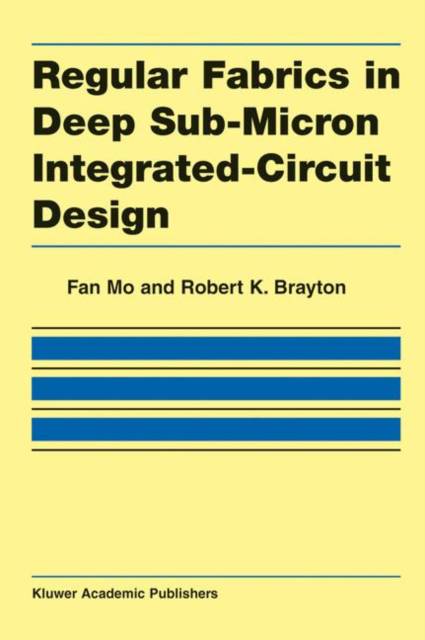
Bedankt voor het vertrouwen het afgelopen jaar! Om jou te bedanken bieden we GRATIS verzending (in België) aan op alles gedurende de hele maand januari.
- Afhalen na 1 uur in een winkel met voorraad
- Gratis thuislevering in België vanaf € 30
- Ruim aanbod met 7 miljoen producten
Bedankt voor het vertrouwen het afgelopen jaar! Om jou te bedanken bieden we GRATIS verzending (in België) aan op alles gedurende de hele maand januari.
- Afhalen na 1 uur in een winkel met voorraad
- Gratis thuislevering in België vanaf € 30
- Ruim aanbod met 7 miljoen producten
Zoeken
Regular Fabrics in Deep Sub-Micron Integrated-Circuit Design
Fan Mo, Robert K Brayton
Hardcover | Engels
€ 153,95
+ 307 punten
Uitvoering
Omschrijving
Regular Fabrics in Deep Sub-Micron Integrated-Circuit Design discusses new approaches to better timing-closure and manufacturability of DSM Integrated Circuits. The key idea presented is the use of regular circuit and interconnect structures such that area/delay can be predicted with high accuracy. The co-design of structures and algorithms allows great opportunities for achieving better final results, thus closing the gap between IC and CAD designers. The regularities also provide simpler and possibly better manufacturability.
In this book we present not only algorithms for solving particular sub-problems but also systematic ways of organizing different algorithms in a flow to solve the design problem as a whole. A timing-driven chip design flow is developed based on the new structures and their design algorithms, which produces faster chips in a shorter time.
In this book we present not only algorithms for solving particular sub-problems but also systematic ways of organizing different algorithms in a flow to solve the design problem as a whole. A timing-driven chip design flow is developed based on the new structures and their design algorithms, which produces faster chips in a shorter time.
Specificaties
Betrokkenen
- Auteur(s):
- Uitgeverij:
Inhoud
- Aantal bladzijden:
- 242
- Taal:
- Engels
Eigenschappen
- Productcode (EAN):
- 9781402080401
- Verschijningsdatum:
- 17/05/2004
- Uitvoering:
- Hardcover
- Formaat:
- Genaaid
- Afmetingen:
- 157 mm x 244 mm
- Gewicht:
- 566 g

Alleen bij Standaard Boekhandel
+ 307 punten op je klantenkaart van Standaard Boekhandel
Beoordelingen
We publiceren alleen reviews die voldoen aan de voorwaarden voor reviews. Bekijk onze voorwaarden voor reviews.









